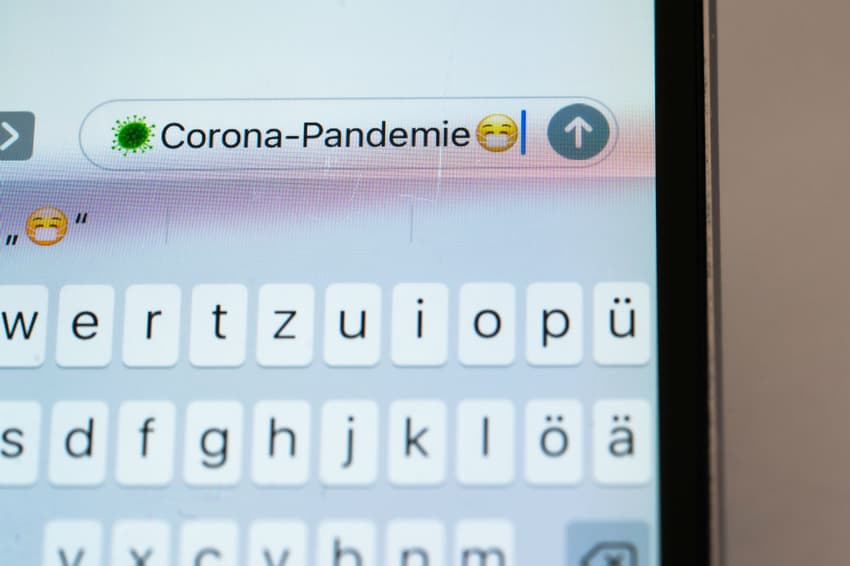These are Germany's 'words of the year' for 2020

Germany’s peak body for the study and promotion of the German language, the Association for German Language, released its 2020 ‘Word/s of the Year’ on Monday. Here's what they are and what they mean.
Based in Wiesbaden, the group releases a list each year of the most significant, frequently used terms in the media.
Predictably, the Covid-19 pandemic dominates the list, with ‘Corona-Pandemie’ and ‘Lockdown’ taking the top two spots, and ‘Triage’, relating to hospital care, taking the seventh spot.
1 & 2 are 'Corona-pandemie' and 'Lockdown'. Duh. Fairly self-explanatory there. pic.twitter.com/IxbuNYwbkN
— Mike Stuchbery ?? (@MikeStuchbery_) November 30, 2020
‘Black Lives Matter’, one of the other significant news stories of the year, also came in at number four.
READ ALSO: EXPLAINED: The ultimate German A-Z guide of coronavirus terms
As for some of the other terms on the list, here’s a quick explainer.
Verschwörungserzählung
This tongue-twister is one of the phrases Germans use to describe conspiracy theories. Germany has struggled with conspiracy theorists this year, driven by the Corona pandemic.
The ‘Querdenker’ movement, that opposes lockdowns and denies the severity of the pandemic, has been a major headache for police and governments across the country.
AHA

An AHA sign in Berlin in July. Photo: DPA
This is actually an acronym, and constitutes the federal government’s official advice regarding daily behaviour during the pandemic. ‘Abstand’ refers to keeping distance, followed by ‘Hygiene’ and finally ‘Alltagsmaske’, referring to the wearing of a face mask. Now, an additional ‘A’ has been added, referring to the ‘Corona-Warn-App’ released by the government earlier in the year.
Systemrelevant
‘Systemrelevant’ is used to refer to those key institutions, businesses and groups that are considered vital to the functioning of society. Across the country, this phrase has been used in fierce debate between the sixteen states and the federal government, as different levels of lockdown have been put in place across the country.
Geisterspiele

Cardboard cut-outs of fans in a stadium at at Borussia-Park on April 29th. Photo: DPA
Speaking of key institutions, a global pandemic wasn’t enough to stop the Bundesliga from playing football matches this year. However, due to restrictions regarding the spread of Covid-19, these matches were played without a crowd in attendance, leading to the term ‘Geisterspiele’ - literally ‘ghost games’ - being coined to describe them.
Gendersternchen
Reflecting the trend across the world towards more inclusive language, the German language tackled the problem of different terms for male and female professionals by introducing the ‘Gendersternchen’, an asterix between the title and the female ‘-innen’ suffix. This is slowly gaining acceptance across the media.
Bleiben Sie Gesund!
Finally, ‘Bleiben Sie Gesund’ is the formal, polite way of telling someone to stay healthy. You’ll see it everywhere, from shop windows to government documents. Bleiben Sie Gesund!
Comments
See Also
Based in Wiesbaden, the group releases a list each year of the most significant, frequently used terms in the media.
Predictably, the Covid-19 pandemic dominates the list, with ‘Corona-Pandemie’ and ‘Lockdown’ taking the top two spots, and ‘Triage’, relating to hospital care, taking the seventh spot.
1 & 2 are 'Corona-pandemie' and 'Lockdown'. Duh. Fairly self-explanatory there. pic.twitter.com/IxbuNYwbkN
— Mike Stuchbery ?? (@MikeStuchbery_) November 30, 2020
‘Black Lives Matter’, one of the other significant news stories of the year, also came in at number four.
READ ALSO: EXPLAINED: The ultimate German A-Z guide of coronavirus terms
As for some of the other terms on the list, here’s a quick explainer.
Verschwörungserzählung
This tongue-twister is one of the phrases Germans use to describe conspiracy theories. Germany has struggled with conspiracy theorists this year, driven by the Corona pandemic.
The ‘Querdenker’ movement, that opposes lockdowns and denies the severity of the pandemic, has been a major headache for police and governments across the country.
AHA

An AHA sign in Berlin in July. Photo: DPA
This is actually an acronym, and constitutes the federal government’s official advice regarding daily behaviour during the pandemic. ‘Abstand’ refers to keeping distance, followed by ‘Hygiene’ and finally ‘Alltagsmaske’, referring to the wearing of a face mask. Now, an additional ‘A’ has been added, referring to the ‘Corona-Warn-App’ released by the government earlier in the year.
Systemrelevant
‘Systemrelevant’ is used to refer to those key institutions, businesses and groups that are considered vital to the functioning of society. Across the country, this phrase has been used in fierce debate between the sixteen states and the federal government, as different levels of lockdown have been put in place across the country.
Geisterspiele

Cardboard cut-outs of fans in a stadium at at Borussia-Park on April 29th. Photo: DPA
Speaking of key institutions, a global pandemic wasn’t enough to stop the Bundesliga from playing football matches this year. However, due to restrictions regarding the spread of Covid-19, these matches were played without a crowd in attendance, leading to the term ‘Geisterspiele’ - literally ‘ghost games’ - being coined to describe them.
Gendersternchen
Reflecting the trend across the world towards more inclusive language, the German language tackled the problem of different terms for male and female professionals by introducing the ‘Gendersternchen’, an asterix between the title and the female ‘-innen’ suffix. This is slowly gaining acceptance across the media.
Bleiben Sie Gesund!
Finally, ‘Bleiben Sie Gesund’ is the formal, polite way of telling someone to stay healthy. You’ll see it everywhere, from shop windows to government documents. Bleiben Sie Gesund!
Join the conversation in our comments section below. Share your own views and experience and if you have a question or suggestion for our journalists then email us at [email protected].
Please keep comments civil, constructive and on topic – and make sure to read our terms of use before getting involved.
Please log in here to leave a comment.